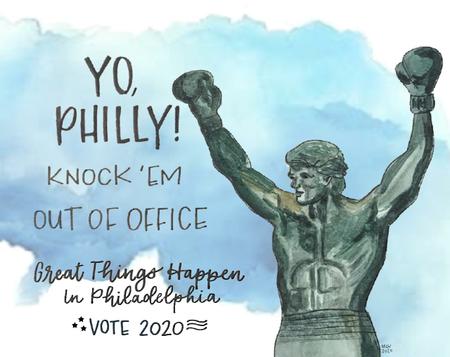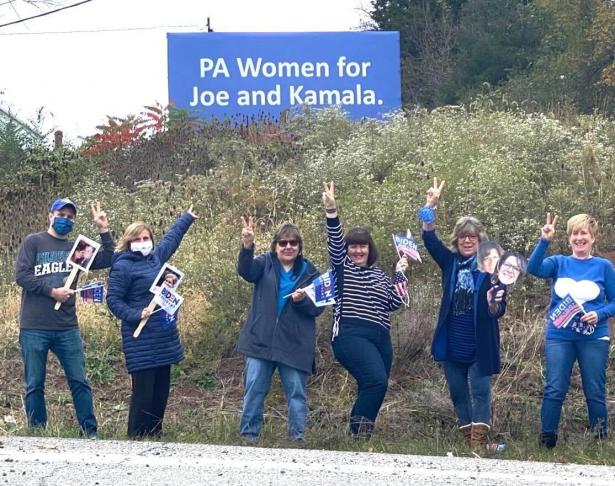“We are 124k in this group and I’m hoping that at least more than half of us (62k+) have voted! Please only respond if you have already voted! Let’s GO!!” posted Ernestine Epouhe in the Facebook group Pennsylvania Women for Biden/Harris on October 29. The question, pasted on a backdrop of swirling blue and red stars and stripes, received more than 25,000 comments and 13,000 reactions—almost all likes, loves, and Facebook’s “caring” reaction.
Epouhe’s post is one of the group’s more popular ones, but even less popular posts garner thousands of engagements. Thousands of others don’t even make it to the page, as the group’s moderators say they just can’t review them all.
The group’s founder, Deborah Eisenberg, told me that the most popular posts are ones that share a story. Posts that proclaim, “2 Republicans, never prouder, to vote straight blue!” Or stories of bedridden or wheelchair-bound elderly parents, casting a vote for Biden. Other posts try to build community. One woman’s husband had mowed “Joe” into their front lawn. Another woman posted about casting her vote with a selfie: She was wearing her homemade Joe Biden mask, “Go With Joe” stenciled above a pair of blue aviators.
The Pennsylvania group, which is nearly 25,000 members larger than the main Women for Biden group on Facebook, gives voice to the most active and determined resisters of this political era. In recent rallies, Donald Trump has taken to begging suburban women to “please like me.” But that bond was already severed by the day after the president’s inauguration. Millions of women marched in protest across the country, and never stopped. They formed the backbone of resistance groups like Indivisible and Swing Left, and they were integral to the Democratic takeover of the House of Representatives in 2018. Polls show a historic gender gap between Biden and Trump this year, bringing states into play that were once out of reach for Democrats, thanks to spikes in the suburbs around Phoenix and Atlanta and Houston. If the president loses re-election, women will be the cause. And in particular, Pennsylvania Women for Biden/Harris.
Although the Facebook group includes many lifelong Democrats, the group has also become a “safe space” for women who support Joe Biden, but have Republican husbands, parents, in-laws, or friends. In the comments, women ask each other about approaching their conservative family and how to convince them. Many women share stories of convincing their father or husband to vote for Biden. While the group appears to be majority-white, there are members of color.
Many group members are from areas of Pennsylvania outside of the population centers in Philadelphia and Pittsburgh, where Democrats are in the minority. Eisenberg told me that in these towns, unlike the “blue bubbles” on the coast, it’s hard to be a Democrat. The group, Eisenberg said, builds solidarity among these women. In one instance, a woman posted that her Biden/Harris sign had been stolen. But her husband had a solution. He fashioned a new sign for her—four by eight feet and weighing in at 100 pounds. “I’d like to see someone walk off with this one!!” she wrote.
“The number one thing [in the group] is people sharing their stories and talking about how they’re dealing with their lives and how they deal with living in both the blue and red Pennsylvania at the same time,” Eisenberg said. “That’s really what’s built community on the page.”
THE FACEBOOK GROUP STARTED in March of this year with just a few thousand members. It’s part of a national Women for Biden network that is organizing women around the country, with a special emphasis on swing states like Pennsylvania. But the Keystone State’s Facebook group has grown to include more members than the national group—124,000 strong and still growing in the final days before the election. The next-biggest state group is in North Carolina, with more than 35,000 members. The national group has just under 100,000 members.
Eisenberg founded the group, she told the Prospect, when the campaign was looking for an organizer. Her husband had started the Facebook group that ultimately became the official Biden group in Pennsylvania. While Eisenberg had organized for candidates before, she was unfamiliar with digital organizing and she had little to no experience organizing for a presidential race. Because the Biden campaign has not engaged in traditional campaigning methods during the COVID-19 pandemic, digital organizing has become a focal point.
The group’s posts often reflect the urgency members feel about their state, which is arguably the most important in the entire presidential election. One person shared a recent article that indicated a Trump loss in Pennsylvania would drop his chances of winning the election to 2 percent. Another shared an article that indicated the election could depend on Pennsylvania’s seniors. The FiveThirtyEight election forecast envisions Pennsylvania as the “tipping point” state, meaning it comprises the electoral votes most likely to put the winner over the top. Its forecast shows Biden leading, based on the polls, by a little over five points. The latest poll from The Hill/HarrisX shows Biden up by five, with a RealClearPolitics average of Biden up by almost four.
Clearly, both campaigns have internalized the state’s importance. On Friday, Biden announced that his campaign—including Joe Biden, Jill Biden, Kamala Harris, and Doug Emhoff—would be “barnstorming” Pennsylvania on Monday. Likewise, Trump plans to hold three rallies there on Saturday. The Trump campaign has engaged in numerous lawsuits and excessive voter monitoring, seeking to chip away at Biden’s polling advantage through suppressing the vote. In an extreme scenario, a contested result could lead to the Republican legislature sending electors who would likely vote for Trump, while the Democratic governor and secretary of state could send contrary electors reflecting a Biden victory.
As the Facebook group grew, Eisenberg added moderators to help run it, such as Meredith Ludlow, who joined in early July. An independent who hails from the suburbs of Philadelphia, Ludlow said she comes from a conservative family and she still doesn’t know how her mother, a lifelong Republican, voted in 2016. But this year, Ludlow says her mother is voting for Biden, and the two plan to canvass together this weekend.
The inflection point for the group’s growth, Eisenberg said, was the announcement of Kamala Harris as vice-presidential nominee. At that point, the group was at about 9,000 members, but within a week it had jumped to 30,000 and jumped again to 40,000 within three weeks. “Her presence on the ticket energized the campaign,” she said.
Meghan Gaffney Wells, a woman in western Philadelphia, posted a video of when she voted. Her young son said, “My mom votes for good guys.” The moderators approved the post and it was a hit. “I was reading through the comments to my husband just with tears in my eyes,” Gaffney Wells said. Gaffney Wells and her husband voted for Hillary Clinton in 2016, and she didn’t want a repeat of what happened in Pennsylvania that year, when Trump won the state by a little over 44,000 votes. Having grown up in Delaware County—which she described as “very, very red” at that time—she has Republican family members, and several of them voted for Trump in 2016. But this year, after four years of persuasion, her father is voting for Biden.

“To be in a statewide group where my values are shared has been a really powerful and necessary experience,” Gaffney Wells told the Prospect. She had her second child this summer, and her young children have largely prevented her from campaigning for Biden in traditional ways. Instead, she and her husband have created art to sell in support of the campaign, with 20 percent of the proceeds going to the ACLU.
Another woman who joined the group after Harris was added to the ticket makes her own Biden/Harris face masks. Eleanor Lewis said she’s voting for Biden because with him, there’s at least a hope. “My mom and my sister both had COVID, the other guy, it’s like he doesn’t have a clue,” she said.
While largely strangers engaging with each other on the internet, the group does also coordinate on-the-ground organizing. Sometimes it’s a phone or text bank, where volunteers can ask questions in a group Slack and engage with each other over Zoom. Eisenberg said running a shift of text banking for the group is almost entirely answering questions, because so many are new volunteers. Eisenberg said one of their most effective organizing methods involves the Vote Joe app, a phone program that allows volunteers to sync their contacts and text them to vote. The week leading up to the election, the group has hosted “friend banks” nearly every evening, where women can interact with each other over Zoom as they work to get out the vote.
As the final days approach, Ludlow said that some members will be canvassing this weekend. They’re doing a socially distanced lit drop: Attach Biden campaign literature, ring the doorbell, step back at least six feet, and hope to engage the voter with a smile behind a mask. Last weekend, volunteers from other states joined Ludlow in canvassing in Philadelphia, and this weekend, out-of-state volunteers along with Pennsylvania natives plan to work the Philly suburbs.
Some of the organizing looks a bit more orthodox. Over the summer, Dana Careless, who had been traveling in New Jersey, spotted an airplane flying with a Trump banner across the state. Angered by the sight, she posted in the group and—because the group’s moderators don’t allow fundraising on the page—off the page, she organized women to charter their own plane. It flew over Philadelphia and the suburbs, Biden/Harris sign in tow.

Nina Basile, another member of the group, wanted a prominent way to illustrate the group’s support and its mobilizing power. She organized 28 other women to sponsor a large billboard at the busy intersection of Route 422 in Reading, Ludlow told the Prospect. Last Sunday, the billboard was featured on This Week With George Stephanopoulos.
Members have become such prolific posters that Eisenberg said she has had to keep adding moderators. The group now has nearly two dozen, and thousands of posts await approval each day. As the group has gotten bigger, it’s become more “emotionally taxing,” she added. The stress everyone is under in the group—members and moderators included—sometimes will “bubble up.” She has a weekly team meeting for the moderators in addition to their meetings with the national Women for Biden group. “Every week, I tell people to practice self-care,” she said. Moderators have shifts of two hours a day.
In the waning days of the campaign, the moderators prioritize voting and election information. The moderator team trained with the Pennsylvania voter protection team, and Eisenberg said that they know people come to the platform regularly for updated information on voting in Pennsylvania.
“The key to Biden winning Pennsylvania is not letting the Republicans repress and steal the vote, and so we all have to be vigilant and involved in this effort,” she said.
IN SEPTEMBER, ONE WOMAN POSTED asking what group members were doing to help elect the Biden ticket. “Not suggesting knocking on doors, but there are other ways. Just look in the mirror and ask what you can do to help,” she wrote. Hundreds replied.
A month later, a different woman posted with a bright-orange Halloween-themed backdrop, “What are some last minute things you’re doing over the next week to help get Joe and Kamala elected? Volunteering, donating? Etc?” As of October 29, the post had more than 500 comments. Some said they were mailing postcards to voters in South Carolina. Others were praying. Others were collaborating with their employer, a restaurant, to budget for burrito donations for poll workers and voters waiting in long lines. Still others were phone banking and text banking.
Lately, selfies of group members boasting “I voted” stickers have taken center stage. And the group’s moderators have continued to prioritize information about GOTV events, voter disinformation and suppression, and personal stories of members’ efforts to get their loved ones to vote.
Almost as much as anything, the group is a support network, a way for women tucked away in all corners of Pennsylvania to be proud of their politics and their organizing work. The encouragement is contagious, keeping the Pennsylvania women going through the stretch run.
A recent post from Eisenberg linked to an article from the Los Angeles Times headlined “Meet the ‘Shy’ Biden Voters Quietly Living in Pennsylvania’s Trump Country.” Eisenberg wrote, “Feel like so many of you could have been the subject of this story …” Within an hour, the post had over a thousand likes or loves, nearly 250 comments, and close to 50 shares.
“Hopefully, we won’t leave a single vote on the field,” Eisenberg said.
[Marcia Brown is a writing fellow at The American Prospect.]
Read the original article at Prospect.org.
Used with the permission. © The American Prospect, Prospect.org, 2020. All rights reserved.
Read the original article at Prospect.org.
Used with the permission. The American Prospect, Prospect.org, 2020. All rights reserved. https://prospect.org/
Support the American Prospect.
Click here to support the Prospect's brand of independent impact journalism


Spread the word